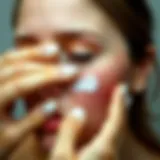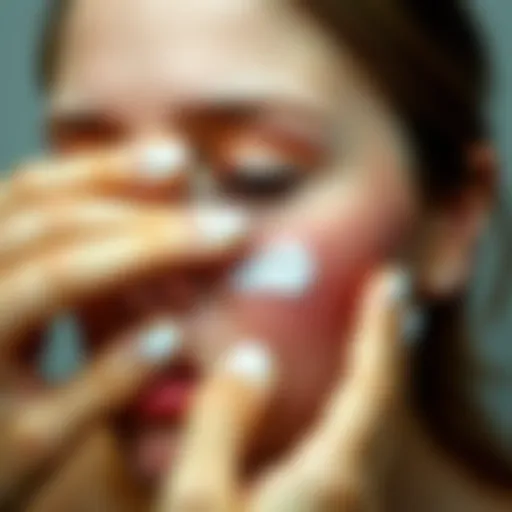Understanding the Causes of Erectile Dysfunction in Men in Their 50s


Intro
Erectile dysfunction (ED) is increasingly recognized as a complex condition impacting men, particularly those in their 50s. The implications of ED extend beyond the physical realm, affecting emotional, relational, and psychological well-being. Understanding what triggers ED in this specific age group is crucial. Several intertwined factors contribute to this condition, including physiological age-related changes, medical conditions, and lifestyle decisions. This examination lays the groundwork for acknowledging the scope of the issue, thereby informing potential intervention strategies.
Health Benefits
Physical Health Benefits
Addressing erectile dysfunction in middle-aged men can yield significant physical benefits. Men often overlook the relevance of overall health in relation to erectile function. Typically, conditions like hypertension, diabetes, and obesity play a notable role in the onset of ED. By focusing on health improvement, such as managing blood pressure or reducing body weight, men may find a positive impact not only on their sexual health but also on their general physical health.
Increased physical activity and a balanced diet can enhance circulation and promote better heart health. This in turn can lessen the risks associated with ED. Notably, engaging in consistent aerobic exercises can lead to improved cardiovascular health, increasing the likelihood of restoring erectile function.
Mental Health Benefits
The influence of mental health on sexual function cannot be overstated. Emotional stress, anxiety, and depression often compound the experience of erectile dysfunction due to psychological barriers. When men actively seek strategies to improve their mental resilience and well-being, they may notice beneficial effects on their erectile health.
Cognitive-behavioral therapy, mindfulness practices, and stress management techniques can serve as effective tools. By fostering a more balanced mental state, men can reduce the pressure associated with sexual performance, enhancing their overall emotional health. Improved mental well-being is likely to enhance sexual intimacy, leading to more satisfying relationships.
"Understanding the interplay between physical and mental health is essential for men grappling with erectile dysfunction, especially in their 50s."
Practical Tips
Healthy Eating Guidelines
Diet plays a fundamental role in managing erectile dysfunction. Here are some guidelines for establishing a healthier eating pattern:
- Prioritize fruits and vegetables: These are rich in antioxidants and nutrients crucial for cardiovascular health.
- Incorporate whole grains: Foods like brown rice and whole grain bread can offer sustained energy.
- Choose healthy fats: Avocados, nuts, and olive oil can support overall health.
- Limit processed foods: Reducing sugar and unhealthy fat intake can mitigate health issues linked to ED.
Consistently applying these dietary practices can result in notable health improvements, fostering a more robust sexual function.
Effective Workout Routines
Physical activity is fundamental in alleviating symptoms of erectile dysfunction. Here are practical workout recommendations:
- Cardiovascular exercises: Aim for at least 30 minutes a day of activities like walking, cycling, or swimming.
- Strength training: Incorporating resistance workouts twice a week can help build muscle and improve metabolism.
- Pelvic floor exercises: Specific routines such as Kegels can enhance pelvic muscle control.
Adopting a regular exercise regimen can lead to better blood flow, which is paramount for erectile function.
Intro to Erectile Dysfunction
Erectile dysfunction (ED) is an emerging concern as men age, particularly those in their 50s. This stage of life presents unique physical and psychological challenges that can contribute to difficulties in maintaining an erection. Understanding these factors is essential, not only for the affected individuals but also for the medical professionals, wellness coaches, nutritionists, fitness trainers, and mindfulness instructors who guide them.
This article will explore the various causes of ED, breaking down the physiological, medical, and psychological factors that may play a role in its development. Moreover, by understanding the prevalence of ED in men in their 50s, the importance of addressing the issue becomes apparent. The goal is to empower individuals facing this condition, providing them with insights and tools necessary to confront their circumstances effectively.
Defining Erectile Dysfunction
Erectile dysfunction is characterized by the persistent inability to achieve or maintain an erection sufficient for satisfactory sexual performance. It is not simply an occasional problem but a consistent struggle that arises more frequently over time. While some may dismiss ED as an inevitable consequence of aging, it is often symptomatic of underlying health issues or other factors that can be addressed.
The causes of ED vary widely and can include physical factors such as hormonal imbalances, cardiovascular diseases, and diabetes, as well as psychological issues like anxiety and stress. It is essential to view ED as a complex condition, rather than just a standalone issue affecting sexual performance.
Prevalence of ED in Men in Their 50s
The prevalence of erectile dysfunction among men increases significantly with age. Recent studies indicate that nearly 40% of men in their 50s experience some degree of ED. This statistic underscores the need for education about the condition, as many men may assume that such issues are uncommon or due to physical decline alone.
- **Factors Influencing ED:
- Age is a primary factor; risk increases as men grow older.
- Lifestyle choices, such as smoking and alcohol use, also play a significant role.
- Pre-existing medical conditions can exacerbate issues with erectile function.**
"Erectile dysfunction is not merely an aging issue but a multifaceted problem influenced by various factors. Understanding the scope of the problem can lead to better management and treatment strategies."
Physiological Changes in the 50s
Understanding physiological changes in men’s 50s is crucial in addressing erectile dysfunction. During this stage of life, various biological processes occur that significantly influence not just sexual health, but overall well-being. Hormones fluctuate, bodily systems become less efficient, and lifestyle choices can exacerbate these changes. The impact of these alterations sets the stage for a deeper exploration into erectile dysfunction and its myriad of causes.
Hormonal Shifts
With age, men experience hormonal shifts that play a vital role in sexual health. These changes can directly affect libido, erectile function, and even mood. As men enter their 50s, the decline of testosterone becomes particularly pronounced.
Decline in Testosterone Levels
One of the prominent aspects of hormonal shifts is the decline in testosterone levels. This hormone is significant for sexual function, affecting arousal and the ability to achieve and maintain erections. Its gradual decrease often leads to symptoms like reduced sexual desire and difficulties in sexual performance.
The key characteristic of this decline is its slow progression. Men may not immediately notice the effects, making it an insidious aspect of aging. This decline is relevant to the article as it profoundly connects to erectile dysfunction, highlighting why many men in their 50s face these challenges.
One unique feature of the decline in testosterone is the range of factors that can influence its levels besides age. Lifestyle choices such as weight and physical activity are intertwined with hormonal health. Lower testosterone levels can lead to reduced motivation for physical activity, creating a feedback loop that can worsen physical health.
Effects of Dihydrotestosterone
Dihydrotestosterone (DHT) is another key androgen that may contribute to erectile dysfunction. While it is derived from testosterone, its effects on the body can differ. DHT plays a crucial role in many biological processes, including the development and maintenance of male characteristics.
The increase in DHT often correlates with hair loss and benign prostatic hyperplasia as men age. Its implications for erectile function are often overshadowed by the focus on testosterone, yet it remains vital. DHT's unique characteristic is its binding to androgen receptors more effectively than testosterone, making it potent in certain tissues.


This effect gives it a significant role in sexual function, but it can also lead to unwanted side effects like prostate enlargement. Understanding its dual nature enriches the article, as it emphasizes the complexity of hormonal impacts on erectile dysfunction.
Blood Circulation and Erectile Function
Blood circulation is essential for erectile health. The ability to achieve and maintain an erection relies heavily on proper blood flow to the penis. When vascular health is compromised, erectile dysfunction often follows.
The Role of Blood Flow
The essential aspect of blood flow in achieving erections cannot be overstated. Erection occurs when blood engorges the penile tissues, a process that requires intact blood vessels and adequate blood flow from the heart. Poor circulation due to age-related factors can hinder this process.
A key characteristic of effective blood flow is its linkage to overall cardiovascular health. Regular cardiovascular exercise can benefit blood circulation, which is crucial for maintaining erectile function. The artile emphasizes this relationship, offering insights into the preventive measures men can take against erectile dysfunction.
Moreover, impaired blood flow can lead to insufficient erection hardness and longevity, making this an important consideration in the discourse of erectile dysfunction.
Impact of Blood Vessel Health
Blood vessel health is directly correlated with erectile function. Healthy arteries are necessary to ensure optimal blood flow during sexual arousal. Conditions like atherosclerosis can lead to narrowing of the arteries, impeding blood flow and exacerbating erectile dysfunction.
The unique feature of blood vessel health is its susceptibility to lifestyle influences, including diet and smoking. Poor vascular health not only affects sexual function but also general health, illustrating a broader insistence on lifestyle improvements. This dual benefit of improved health outcomes and enhanced erectile function underlines the significance of the characters in the article.
Strong vascular health is critical for erectile function and overall male sexual health, emphasizing the benefits of a healthy lifestyle.
In summary, the physiological changes accompanying aging are complex. Understanding these shifts, especially in relation to hormonal and vascular health, is essential for comprehensively addressing erectile dysfunction in men in their 50s.
Medical Conditions Linked to Erectile Dysfunction
Erectile dysfunction (ED) is far more than just a temporary physical issue. It can point to underlying medical conditions that need attention. This section discusses the significant medical factors contributing to ED in men in their 50s. Understanding these connections is pivotal for better management and treatment of erectile problems. Identifying and addressing the medical causes can often lead to improved sexual health and overall well-being.
Cardiovascular Issues
Cardiovascular problems are often closely linked to erectile dysfunction. Conditions such as hypertension, atherosclerosis, and coronary artery disease can restrict blood flow, which is essential for achieving and maintaining an erection. The relationship between heart health and erectile function becomes more evident with age. Men in their 50s are more likely to experience these conditions, putting them at greater risk for ED.
Addressing cardiovascular health through lifestyle changes and medical management can significantly influence erectile function. Regular check-ups, blood pressure monitoring, and adapting heart-healthy habits may restore some erectile capabilities and improve overall vitality.
Diabetes and Its Implications
Diabetes is a primary contributor to erectile dysfunction in middle-aged men. High blood sugar levels can damage blood vessels and nerves, both crucial for getting an erection. Importantly, about 50% of men with diabetes experience some form of ED, which often develops approximately 10 to 15 years earlier than in non-diabetic men.
Managing diabetes through diet, exercise, and medication can mitigate its effects on erectile function. Educating men on the link between diabetes and ED promotes proactive health management, yielding not only sexual benefits but also improvements in quality of life.
Neurological Disorders
Neurological disorders can also play a significant role in the onset of erectile dysfunction. Two notable conditions are Multiple Sclerosis and Parkinson's Disease, each affecting erectile health in distinct ways.
Multiple Sclerosis
Multiple Sclerosis (MS) is characterized by nerve damage that interferes with signals between the brain and the body. One of the collateral impacts of MS can be sexual dysfunction, including ED. Because MS affects motor functions and sensation, it complicates the signaling needed for an erection.
The key characteristic of MS is its unpredictable nature, leading to varying levels of sexual dysfunction among patients. This makes it a unique subject for discussion in this article. Understanding MS's implications on erectile health is essential for tailored treatment strategies, as effective communication and appropriate interventions can improve outcomes for those affected.
Parkinson's Disease
Parkinson's Disease (PD) is another significant neurological condition impacting erectile function. The deterioration of dopamine-producing neurons can lead to reduced sexual desire and performance. Besides the direct neurological implications, medications used to treat PD may also contribute to erectile challenges. This dual effect underscores the importance of a comprehensive approach to treatment.
Erectile dysfunction is prevalent in men with PD, making it vital to address both the disease's progression and its complications. Patients can benefit from education about their condition's impact on sexual health.
Chronic Conditions and Medications
Chronic health issues often come with medication dependencies that can affect erectile function. The interplay between chronic illnesses and the pharmaceuticals used to manage them may further complicate sexual health.
Hypertension Medication
Hypertension medication can contribute to erectile dysfunction. Many common antihypertensives are associated with sexual side effects. The most prevalent classes, such as beta-blockers and diuretics, may impair blood flow and reduce libido. Therefore, selecting appropriate treatment options while considering their side effects is crucial for men dealing with both high blood pressure and ED.
Antidepressants and Their Effects
Antidepressants also merit consideration as they can lead to sexual side effects, including ED. In particular, selective serotonin reuptake inhibitors (SSRIs) are well known for this complication. The psychological factors of depression combined with pharmacological side effects create a challenging situation for many men. Understanding this connection empowers patients to have informed discussions with healthcare providers regarding alternative therapies or adjunct treatments that might mitigate these effects.
It is essential for men to consult with healthcare professionals to understand the medical conditions contributing to erectile dysfunction, as targeted management can lead to substantial improvements in sexual health.
Psychological Factors Contributing to Erectile Dysfunction
Understanding the psychological factors that contribute to erectile dysfunction (ED) is crucial for addressing this condition effectively. Mental health significantly impacts physical health, particularly in men in their 50s. Individuals in this age group often face various life transitions, such as career changes, aging, and shifts in relationships. These factors can lead to psychological distress, which may manifest as anxiety or depression, both of which can further aggravate ED.
In addressing the psychological components of ED, it is important to recognize the interplay between mental well-being and erectile function. By focusing on these elements, healthcare professionals can develop comprehensive strategies that not only target the symptoms but also support the overall mental health of their patients.
Anxiety and Depression
Anxiety and depression are two primary psychological issues linked to erectile dysfunction. Anxiety can stem from various sources, including performance pressure or fear of inadequacy. For many men, the fear of not achieving or maintaining an erection may lead to heightened anxiety during intimate situations. This cycle can become self-perpetuating, where anxiety worsens erectile dysfunction, leading to further anxiety and so on.
Research indicates that depression can also play a significant role in ED. Men who experience depressive symptoms may have reduced libido and, consequently, may find it difficult to engage in sexual activity. This loss of interest can contribute to feelings of isolation and inadequacy, worsening their overall mental health.
It is essential for professionals in mental health and wellness fields to assist patients in identifying and managing these emotional challenges. Interventions may include therapy, mindfulness practices, or appropriate medications. For some, counseling may offer a space to express fears and concerns, which can relieve performance-related stress and improve sexual function over time.


Stress and Relationship Issues
Stress is another psychological factor that can have a profound impact on erectile function. High levels of stress from work or personal responsibilities can lead to fatigue, distraction, and a lack of focus on intimacy, all of which can hinder sexual performance. In the case of men in their 50s, this stress may be compounded by financial pressures, health concerns, or caregiving responsibilities for aging parents.
In addition, relationship issues can also manifest as stress. Problems with communication, intimacy, or unresolved conflicts can contribute to a negative feedback loop wherein stress impedes emotional closeness, which in turn exacerbates erectile dysfunction. Couples may find it beneficial to engage in joint counseling sessions to improve communication and resolve underlying conflicts. This approach can strengthen emotional bonds and alleviate pressure associated with sexual performance.
In summary, comprehending the psychological factors contributing to erectile dysfunction is pivotal for effective management. By addressing anxiety, depression, stress, and relationship dynamics, healthcare providers can create an environment conducive to recovery, which ultimately enhances both mental and physical health for men in their 50s.
Lifestyle Choices Impacting Erectile Dysfunction
Lifestyle choices significantly impact the occurrence and management of erectile dysfunction in men in their 50s. These choices can either exacerbate the symptoms or contribute to their alleviation. Understanding the factors of smoking, alcohol consumption, and obesity, alongside physical activity, offers insights into preventive measures and treatment approaches. Making informed lifestyle decisions can enhance not only sexual health but overall wellbeing.
Smoking and Tobacco Use
Smoking is one of the most notable lifestyle choices affecting erectile dysfunction. Tobacco use leads to vascular problems that impair blood flow. Reduced blood circulation directly impacts the ability to achieve and maintain an erection. Furthermore, nicotine constricts blood vessels, limiting the oxygen supplied to the body, which can lead to complications in vascular health. Quitting smoking is essential not only for general health but also as a specific strategy to manage and improve ED symptoms.
Alcohol Consumption
Excessive alcohol consumption is another significant factor contributing to erectile dysfunction. While moderate alcohol intake might not pose serious risks for erectile health, heavy drinking can disrupt hormone levels and impair nerve function. Alcohol acts as a depressant that can lower sexual arousal and testosterone levels. Men who consume alcohol excessively should consider reducing their intake as part of a broader strategy for improving erectile function. Focusing on moderation is critical to achieving better sexual health outcomes.
Obesity and Physical Activity
Obesity is closely linked to erectile dysfunction, and the relationship between weight and sexual health can be intricate.
Correlation Between Weight and ED
The correlation between weight and erectile dysfunction is clear: higher body mass index (BMI) often correlates with increased incidence of ED. Excess fat, especially around the abdomen, affects hormone levels and contributes to insulin resistance. This hormonal imbalance can lead to lower testosterone levels, further complicating erectile health. For men in their 50s, maintaining a healthy weight is a crucial step in preventing and managing erectile dysfunction. Weight loss can result in significant improvements in sexual health, underscoring the importance of lifestyle interventions.
Benefits of Regular Exercise
Regular exercise emerges as a powerful tool in combating erectile dysfunction. Engaging in physical activity promotes better cardiovascular health by improving blood circulation. It can help maintain healthy weight levels while also reducing stress, another contributor to ED. Exercise stimulates the release of endorphins and testosterone, improving mood and sexual function. Incorporating a mix of aerobic and strength-training exercises into daily routines can offer comprehensive benefits, making this an essential recommendation for men aiming to enhance their erectile health.
Improvement in erectile dysfunction through lifestyle modifications can lead to better overall health and enhanced quality of life.
In summary, smoking, alcohol consumption, and obesity combined with physical activity play crucial roles in erectile dysfunction among men in their 50s. Understanding these aspects helps guide effective management strategies toward healthier lifestyle choices.
External Stressors and Their Role
External stressors play a significant role in the development of erectile dysfunction (ED) in men in their 50s. At this stage of life, men are often faced with a multitude of pressures that can adversely affect their physical and emotional health. Understanding these stressors is critical in addressing their impact on erectile function. Work-related stress, financial burdens, and other external pressures can create an environment that exacerbates existing issues or contributes to new ones.
By recognizing how external outcomes can influence erectile health, men can take proactive measures to mitigate these risks. This section will delve into the nuances of workplace stress and financial concerns, shedding light on their effects on men’s overall well-being and erectile functionality.
Workplace Stress and Its Effects
The workplace can be a source of significant stress for many individuals. High demands, tight deadlines, and insecurity about job stability can generate anxiety that seeps into personal life, including sexual health. Studies show that chronic workplace stress is linked to an increase in mental health issues, such as anxiety and depression, which are themselves contributing factors to ED.
When men face stress at work, their bodies respond by engaging the fight-or-flight response. This reaction involves the release of hormones like cortisol and adrenaline, which can lead to decreased blood flow and impact erectile function. Additionally, workplace stress often leads to fatigue, greatly reducing the desire for sexual activity. The negative feedback loop between stress and erectile health can be both discouraging and damaging.
Here are some considerations about the effects of workplace stress:
- Increased anxiety can lead to performance anxiety during sexual encounters.
- Chronic stress can trigger changes in hormonal levels.
- Disrupted sleep patterns due to stress can contribute to fatigue.
- Reduced self-esteem can impact relationships.
Addressing workplace stress involves fostering a healthy work-life balance and seeking support when necessary. Whether through counseling, stress management training, or simply communicating with employers, taking these steps can have a positive effect on overall well-being and, subsequently, on erectile function.
Financial Concerns
Financial troubles are also substantial external stressors that many men face in their 50s. The pressure of managing finances—whether it involves preparing for retirement, dealing with unexpected expenses, or providing for family—can lead to chronic stress. This stress can occupy the mind, leaving little room for intimacy and connection with a partner.
The relationship between financial stress and erectile dysfunction is well-documented. Elevated anxiety over finances can trigger a sense of helplessness and fear of inadequacy. Such feelings can suppress libido and negatively affect a man’s ability to achieve or maintain an erection.
Consider the following impacts of financial stress on erectile health:
- Worry about money can lead to heightened anxiety or depression.
- Strains on relationships due to financial discussions can decrease intimacy.
- Lack of funds may limit access to healthcare options.
- Stress-induced changes in lifestyle habits, such as reduced physical activity or unhealthy eating, can compound the issue.
Managing financial stress involves both practical and emotional approaches. Seeking financial advice, creating budgets, and engaging in open discussions with partners can alleviate some burdens. Men may also benefit from counseling to help them process their feelings around financial stress, which might improve their emotional state and lead to better sexual health.
In summary, addressing external stressors is essential for men in their 50s to improve their sexual function. By understanding the influence of workplace and financial stress, men can take actionable steps towards management and, in turn, may alleviate some symptoms of erectile dysfunction.
Common Misconceptions About Erectile Dysfunction
Erectile dysfunction (ED) is often shrouded in myths and misunderstandings. Addressing these misconceptions is crucial for several reasons. First, many men feel shame or embarrassment about experiencing ED, and these feelings can perpetuate a stigma. Understanding the truth behind common beliefs can help dispel some of the fear and misunderstanding. Furthermore, accurate knowledge about ED can lead to better management options and improved emotional wellbeing for affected individuals.
ED Is a Normal Part of Aging
One prevalent myth is that erectile dysfunction is an inevitable consequence of aging. While it's true that age can contribute to ED, it is not a normal part of growing older. Many men in their 50s maintain sexual function and satisfaction well into their later years. Factors such as hormonal changes, health conditions, and lifestyle choices play a significant role in the occurrence of ED. Ignoring these underlying aspects misleads men into assuming that there is no hope for improvement. As such, encouraging a dialogue about the potential to address specific issues is vital.
Treatment Options Are Limited
Another common belief is that treatment options for ED are sparse, which is simply not true. In reality, a broad spectrum of interventions exists. These treatments can range from lifestyle adjustments, such as improved diet and exercise, to pharmacological solutions like phosphodiesterase type 5 inhibitors. Moreover, psychological counseling may also be beneficial for individuals facing emotional or relationship-related challenges. By clarifying the range of treatment possibilities, men can feel empowered to seek out solutions that work for them, rather than resigning themselves to a perceived lack of options.
"Knowledge is power. Understanding how misconceptions about erectile dysfunction can shape perceptions allows for better outcomes in treatment and overall health."


In summary, clarifying these misconceptions is essential. By doing so, men can approach ED with an informed perspective, opening doors to effective management and improving their quality of life.
Management and Treatment Strategies
Erectile dysfunction represents a complex interplay of many factors, leading to the need for effective management and treatment strategies tailored to individual circumstances. Recognizing the significant challenges presented by ED is crucial for men in their 50s. Implementing appropriate strategies can help improve not only erectile function but also overall quality of life.
Consulting Healthcare Professionals
Consulting healthcare professionals is the first vital step in managing erectile dysfunction. Physicians can evaluate underlying causes through comprehensive assessments. They may inquire about medical history, medication usage, and lifestyle factors affecting sexual health. This thorough approach aids in identifying specific issues contributing to ED.
Additionally, healthcare providers can offer valuable insights about available treatments. For men experiencing emotional or psychological barriers, they may recommend referrals to specialists, such as urologists or mental health professionals. This multidisciplinary approach ensures that all aspects of the condition are addressed, providing a more holistic path to recovery.
Medications and Therapies
Various medications and therapies can significantly enhance erectile function. Among these, Phosphodiesterase Type 5 Inhibitors are particularly well-known for their effectiveness.
Phosphodiesterase Type Inhibitors
Phosphodiesterase Type 5 Inhibitors, such as Sildenafil (Viagra) and Tadalafil (Cialis), help facilitate erections by improving blood flow to the penis. The key characteristic of these medications is their rapid action, typically producing effects within 30 to 60 minutes. Their popularity stems from their ability to provide timely relief for those needing assistance.
Advantages of Phosphodiesterase Type Inhibitors:
- Non-invasive method compared to surgical options.
- Quick onset of action, making them suitable for spontaneous sexual activity.
Disadvantages may include:
- Possible side effects such as headaches or gastrointestinal disturbances.
- Not appropriate for men who take nitrates or certain other medications.
Psychological Counseling
Psychological Counseling plays a crucial role in addressing the emotional and psychological influences on erectile dysfunction. Many men experience anxiety or depression, which can exacerbate the condition. The key characteristic of psychological counseling is its focus on the mental and emotional aspects of sexual health. This approach enables individuals to explore their feelings and thoughts related to performance issues.
Benefits of Psychological Counseling include:
- Improved coping strategies for performance anxiety.
- Enhanced emotional support, which can lead to better sexual relationships.
However, it also has limitations:
- It may require time and commitment to see significant results.
- Not all men may respond positively to counseling, making it a less predictable option.
Both medical and psychological interventions are essential in developing a comprehensive management plan that addresses not only the physical but also the mental aspects of erectile dysfunction.
Lifestyle Modifications for Improved Erectile Health
Erectile dysfunction can often feel isolating and frustrating, mainly when it stems from a combination of factors. However, lifestyle modifications offer a tangible way to improve erectile health and overall well-being. Changes in diet, exercise, and other habits can make a significant difference. Not only do these modifications potentially improve erectile function, but they also contribute to better physical health and emotional resilience. The importance of these changes lies in their accessibility and the fact that they empower men to take control of their health in a proactive way.
Adopting a Healthy Diet
A healthy diet plays a crucial role in maintaining erectile health. The foods consumed can influence blood flow, hormone levels, and overall vascular health, all of which are essential for sexual function. Certain nutrients have been shown to promote better circulation and hormone balance.
For instance, foods high in antioxidants can help protect blood vessels and improve circulation. Fresh fruits, vegetables, nuts, and whole grains are all excellent choices. Consuming fish rich in omega-3 fatty acids, like salmon, can also aid in vascular health. Conversely, diets high in saturated fats and sugars can lead to vascular problems and decreased blood flow.
Consider the following dietary elements:
- Leafy Greens: Spinach and kale are rich in nitrates, which can enhance circulation.
- Fruits: Berries, particularly blueberries and strawberries, support healthy blood vessels.
- Healthy Fats: Avocados and olive oil contribute to better blood flow.
Overall, maintaining a balanced diet is not just about erectile function; it contributes to optimal health.
Incorporating Regular Exercise
Physical activity is another vital lifestyle change that can have profound effects on erectile health. Regular exercise improves circulation, enhances mood, and helps in weight management, which are all crucial for combating erectile dysfunction. By engaging in physical activity, men can improve their cardiovascular health, which directly impacts erectile function.
A variety of exercises can be beneficial:
- Aerobic Exercise: Activities like running, swimming, and cycling promote better blood circulation.
- Strength Training: Lifting weights helps increase testosterone levels, which is beneficial for sexual health.
- Pelvic Floor Exercises: Also known as Kegel exercises, these can strengthen the muscles involved in erections.
Including physical activity into one’s daily routine need not be overwhelming. Even moderate activities like walking or gardening can be effective. The goal is to make regular movement a part of everyday life, contributing positively to physical and mental well-being.
A commitment to regular exercise and a balanced diet not only helps address erectile dysfunction but also supports overall health and quality of life.
Integrating these lifestyle modifications takes time and effort, but each small change accumulates to significant improvements. Together, they form a robust foundation for better erectile health in men in their 50s.
End
The topic of erectile dysfunction (ED) in men in their 50s holds significant importance, as it encapsulates a multifaceted issue that intertwines physical, emotional, and psychological elements. Understanding the causes is essential for men experiencing ED, as it aids in addressing the problem comprehensively rather than in isolation. This article delves into various aspects that contribute to ED, emphasizing that this condition is not merely a consequence of aging but a complex interplay of factors.
Recap of Main Causes
- Physiological Changes: Declining testosterone levels and alterations in blood circulation are significant physiological aspects that can lead to ED. Hormonal changes disrupt normal functioning, making it crucial to consider clinical evaluations.
- Medical Conditions: Numerous health issues, including diabetes, heart disease, and neurological disorders, are commonly linked to ED. Awareness of these conditions can prompt early intervention that may improve erectile health.
- Psychological Factors: Emotional well-being plays a critical role. Anxiety, depression, and stress can substantially impact sexual function. Addressing these mental health aspects can mitigate some effects of ED.
- Lifestyle Choices: Choices such as smoking, excessive alcohol consumption, and obesity can exacerbate the risk of developing ED. Modifications in lifestyle may provide beneficial outcomes for erectile health.
- External Stressors: Factors like financial worries and workplace stress can also play a role, compounding psychological burdens and influencing overall health.
Encouragement for Seeking Help
It is vital for men facing these challenges to comprehend that seeking help is not a sign of weakness but a courageous step toward improvement. There are various treatment options available, ranging from lifestyle changes and counseling to medical therapies. Healthcare professionals can provide tailored advice based on individual conditions and can facilitate open discussions about ED without stigma. Early and proactive measures could lead to better outcomes and help reclaim confidence and intimacy.
"Addressing erectile dysfunction should begin with understanding it rather than ignoring the issue as a normal part of aging."
Men should not hesitate to consult their healthcare provider to explore all possible solutions. Knowledge is power, and understanding the numerous facets of ED can establish clarity in navigating treatment pathways.
Increasing awareness can empower men to seek assistance and spark conversations that dismantle misconceptions around ED. Embracing this dialogue is essential for both emotional health and physical well-being in addressing erectile dysfunction.















